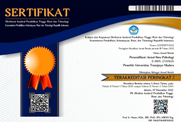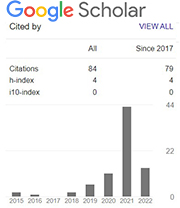Authoritative Parenting and Self-Efficacy as Predictitors of Junior High School's Academic Achievement during The Covid-19 Pandemic
Abstract
Keywords
Full Text:
PDFReferences
Abidin, Z. (2020). Belajar Matematika Asyik dan Menyenangkan. Jurnal Pendidikan Dan Pembelajaran Matematika, 1(1), 1–4. https://osf.io/2hkvm/
Adawiah, R. (2017). Pola Asuh Orang Tua Dan Implikasinya Terhadap Pendidikan Anak. Jurnal Pendidikan Kewarganegaraan, 7(1), 33–48. https://doi.org/http://dx.doi.org/10.20527/kewarganegaraan.v7i1.3534
Amarta, D., Pravesti, C. A., Bk, J., Pedagogi, F., Pgri, U., & Buana, A. (2021). Keefektifan Biblioedukasi untuk Meningkatkan Efikasi Diri Akademik Siswa VII-A SMPN 3 Krian. 6(2), 62–66.
Ayun, Q. (2017). Pola Asuh Orang Tua dan Metode Pengasuhan dalam Membentuk Kepribadian Anak. ThufuLA: Jurnal Inovasi Pendidikan Guru Raudhatul Athfal, 5(1), 102. https://doi.org/10.21043/thufula.v5i1.2421
Daroini, A. F., & Alfiana, H. (2022). Kesulitan Pembelajaran Matematika Di Masa Pandemi: Kebutuhan Akan Modul Untuk Belajar Mandiri. JNPM (Jurnal Nasional Pendidikan Matematika), 6(1), 1. https://doi.org/10.33603/jnpm.v6i1.4604
Delaney, J. M., & Devereux, P. J. (2020). Math matters! The importance of mathematical and verbal skills for degree performance. Economics Letters, 186. https://doi.org/10.1016/j.econlet.2019.108850
Haryudi. (2021). Evaluasi PJJ, Kemendikbud: Ada Penurunan Nilai Hasil Belajar Siswa. Sindonews. https://edukasi.sindonews.com/read/312472/212/evaluasi-pjj-kemendikbud-ada-penurunan-nilai-hasil-belajar-siswa-1611496889
Juli. (2021). Hubungan Kontribusi Pola Asuh Orang Tua Terhadap Prestasi Belajar Anak di Lingkungan RT 001 RW 005 Kelurahan Sungai Beringin Kecamatan Tembilahan. SEKOLAH TINGGI AGAMA ISLAM AULIAURRASYIDIN.
Marlina, I., Marpaung, N., Setia, L., Santo, S. M. P., Ii, L., Studi, P., & Pendidikan, F. (2020). HUBUNGAN ANTARA HARGA DIRI, EFIKASI DIRI AKADEMIK, DAN PENYESUAIAN DIRI TERHADAP LINGKUNGAN SEKOLAH PARA SISWA KELAS VII DI SMP ST. KRISTOFORUS 1. Jurnal Psiko-Edukasi, 18(1), 18–31.
Pirmanto, Y., Farid Anwar, M., & Bernard, M. (2020). Analisis Kesulitan Siswa SMA dalam Menyelesaikan Soal Pemecahan Masalah pada Materi Barisan dan Deret dengan Langkan-langkah Menurut Polya. Jurnal Pembelajaran Matematika Inovatif, 3(4), 371–384. https://doi.org/10.22460/jpmi.v3i4.371-384
Pratini T, S., Sripatmi, S., Azmi, S., & Sarjana, K. (2021). Pengaruh Pola Asuh Orang Tua Terhadap Hasil Belajar Matematika Siswa. Griya Journal of Mathematics Education and Application, 1(4), 570–577. https://doi.org/10.29303/griya.v1i4.116
Risdayanti, S., Ika, A., & Abrar, P. (2022). Influence of Parenting and Learning Disciplines on Mathematical Learning Outcomes of Students Pengaruh Pola Asuh Orang Tua dan Disiplin Belajar Terhadap Hasil. 4(1), 50–63.
Rumliah. (2016). PENGARUH POLA ASUH ORANG TUA DAN DISIPLIN BELAJAR TERHADAP PRESTASI BELAJAR SISWA PADA MATA PELAJARAN PENDIDIKAN AGAMA ISLAM. In Applied Microbiology and Biotechnology (Vol. 85, Issue 1). IAIN SURAKARTA.
Sulistyowati, D. E., & Sriyono, H. (2021). Prestasi belajar ilmu pengetahuan sosial siswa dipengaruhi kecerdasan emosional dan motivasi belajar ( Studi di SMP Negeri Jakarta Barat ). 4, 116–129. https://doi.org/dx.doi.org/10.30998/herodotus.v4i2.8893.g4174
Suriadi, H. J., Firman, F., & Ahmad, R. (2021). Analisis Problema Pembelajaran Daring Terhadap Pendidikan Karakter Peserta Didik. Edukatif : Jurnal Ilmu Pendidikan, 3(1), 165–173. https://doi.org/10.31004/edukatif.v3i1.251
Tamami, F. (2021). Evaluasi Pembelajaran Daring di Masa Pandemi. Jurnal Pendidikan Indonesia, 2(8), 1332–1352. https://doi.org/10.36418/japendi.v2i8.250
WHO. (2021). WHO Coronavirus Disease. https://covid19.who.int/region/searo/country/id
Yuliyani, R., Handayani, S. D., & Somawati, S. (2017). Peran Efikasi Diri (Self-Efficacy) dan Kemampuan Berpikir Positif terhadap Kemampuan Pemecahan Masalah Matematika. Formatif: Jurnal Ilmiah Pendidikan MIPA, 7(2), 130–143. https://doi.org/10.30998/formatif.v7i2.2228
DOI: https://doi.org/10.21107/personifikasi.v13i2.16747
Refbacks
- There are currently no refbacks.
Copyright (c) 2022 Quineke Laksmi Azzala, Ruseno Arjanggi

This work is licensed under a Creative Commons Attribution 4.0 International License.


Personifikasi by Universitas Trunojoyo Madura is licensed under a Creative Commons Attribution 4.0 International License.










